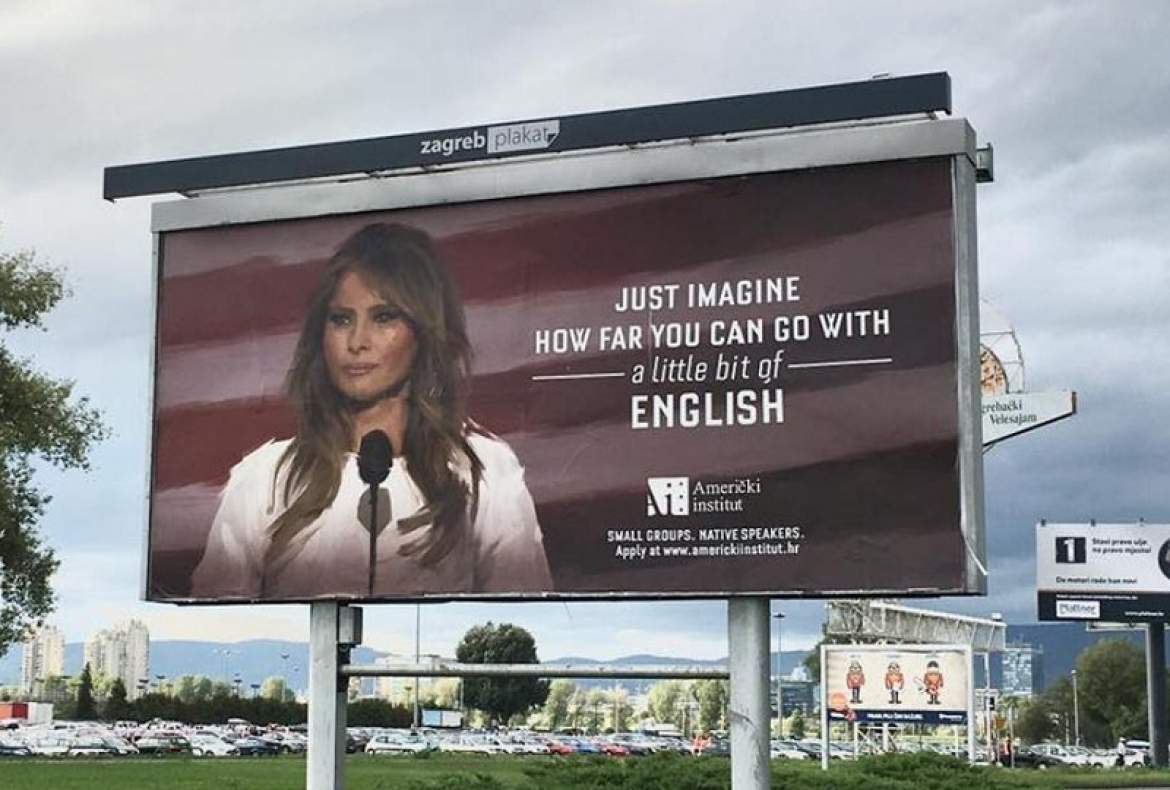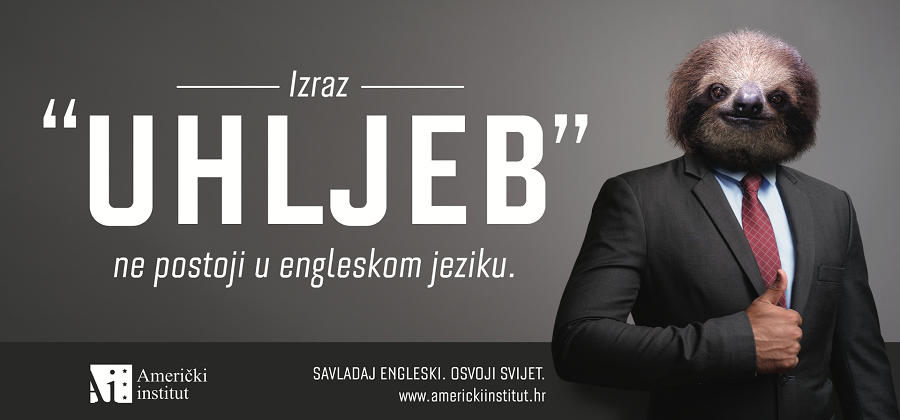New from Melania Billboard Creators: Uhljeb Doesn't Exist in English
June 20, 2019 - Remember THOSE Croatian billboards which around the world in 2017? The creators of the infamous Croatian language institute campaign with an image of Melania Trump are back - 'uhljeb' meets the world.
It is almost two years since some billboards went up in Zagreb and within 24 hours had become one of the most viral global stories of the week. Seemingly every major global media reported on the Američki Institut in Zagreb's campaign to attract new English students with a message with the image of the American First Lady, who hails from neighbouring Slovenia and made it all the way to The White House. Here is the TCN report on it at the time.

I doubt that there has been a more effective billboard campaign with such a reach from such a small budget and number of billboards used, and the PR value was incredible, despite the fact that the billboards were soon removed by the threat of legal action.
But now the Američki Institut in Zagreb is back in the billboard business, this time using a cultural norm closer to home with its message - The word 'Uhljeb' does not exist in English. Master English and conquer the world.
In the last decade, the “uhljeb” phenomenon has become a social norm and a fact of life in Croatia and not much is done about the problem, making it worse every year. Positions within government companies are still being made up and set up for the selected few, while the qualified and capable are leaving the country.” - said Maša Anišić, the founder of Američki Institut in Zagreb.

Additionally, the word “uhljeb” has only been recently used in the Croatian language and there still isn’t a direct translation of the word, which is quite interesting. We wanted to give hope to people, as they will probably not encounter this issue to be detrimental to their careers and lives in Western countries. However, any emigrant will still have to know the basics of the English language in order to get ahead in life and integrate into society. To be perfectly honest, we’re sure there are “uheljbs” anywhere in the world, but in the developed countries the problem is not so severe that it’s driving people to leave their homeland. In Croatia, the “uhljeb” has become a standard and a cultural phenomenon.

How to define the word 'uhljeb'? It is a new addition to the Croatian language, and it refers to someone who gets his job through nepotism, does nothing and is yet one more parasite - as one diaspora businessman so eloquently put it at a recent conference in Split - "sucking on the nation's tits." The biggest attempt at explaining the cult of uhljeb is here.
The closest I can get to explaining it is that the world u (in) and hljeb (similar to the Serb word for bread) would make a translation 'in bread', or someone who is getting something. But in order to become an uhljeb, you have to be intertwined with the system, so my best translation would be 'an inbred in bread.'

LIfe in Croatia changed for me the day I discovered the Cult of Uhljeb, as I explained in A Tale of Two Croatias: Before and After the Uhljeb Discovery.
Another genius campaign, which due to its regional nature will not go as viral as Melania, but I am sure it will do very well indeed.
To get the latest from the mighty State of Uhljebistan, follow the dedicated TCN section.
Uhljeb Alert? One of Poorest Counties in Croatia Establishes Space Technology Centre
Sisak-Moslavina County is one of the poorest in Croatia. However, yesterday it established the Centre for Space and Innovative Technologies. Although the news that a county with many villages without electricity, water and roads has opened a space technology centre sounds like an April Fool’s joke, county officials seem offended by such comparisons, reports Jutarnji List on May 17, 2019.
County prefect Ivo Žinić pointed out that the project “Sisak-Moslavina County - Gaming Industry Centre” has become one of the most innovative projects in Croatia and that the establishment of the Centre for Space and Innovative Technologies will enable the county to become the centre of competence for certain other technologies as well.
“The activities led by the centre can attract a large number of young scientists, and the opening of new jobs will prevent them from leaving the country. The future of Croatia, the future of Sisak-Moslavina County, is in modern technologies,” concluded Žinić.
The decision by the County Assembly has caused an avalanche of comments and jokes on social networks. “A very inventive way to employ party personnel, if there are still few unemployed members left. They need the space centre because HDZ members seem to have come from Mars.”
Some commentators have also advised the authorities to be sure to “set up the Central Agency for the Coordination of County Centres for Space Technology with one coordinator for each county, and a deputy, and a secretary, and a secretary’s deputy.” Others say that the “space centre will gravitate toward HDZ members,” and that the elections are coming soon, but that this idea is too much even for an election campaign.
However, there are other opinions. Danko Bosanac, an astrophysicist from the Ruđer Bošković Institute, support the idea. Several years ago, he initiated the establishment of a similar, never opened centre in Udbina. “I am directly responsible for launching this centre because I have started the Adriatic Aerospace Association.It is fine to express doubts, but it has to be done in a civilized way, because this initiative is supported by A3, with about 60 highly-qualified members from the areas of space technology and science, and with numerous contacts around the world.
The discussion about the Sisak centre lasted for about a year. The centre will primarily focus on the commercialization of top-quality materials that will have the ‘terrestrial’ application. The Faculty of Metallurgy and the Ruđer Bošković Institute will represent a link towards scientific research. There will be a co-operation between science and technology. We should be happy and help this initiative; someone has decided to make a step forward,” said Bosanac.
The information on the establishment of the centre has been published on the Adriatic Aerospace Association’s website. It is a non-profit association that focuses on four main areas: promoting research and development in the aerospace sector, mediating in projects as a point of contact, education and consulting, and regional co-operation.
Translated from Jutarnji List (reported by Anita Belak-Krile).
More news about Sisak-Moslavina County can be found in the Lifestyle section.
Rating of Croatian Mayors, City Administrations and Companies Begins
Just how well do Croatian city administrations work, how well do Croatian mayors actually do their jobs, and how are Croatian companies performing? All will be revealed...
As Vedran Marjanovic/Novac writes on the 9th of April, 2019, just like in 2018, this year, Croatia is beginning to thoroughly monitor and evaluate the work of its many mayor and the administrations of 126 Croatian cities in order to choose the best among them, and all local authorities have been pushing for better management in favour of their respective residents. This is the main mission of the second time of voting for the best Croatian cities under the organisation of the Gradonačelnik.hr portal and the Ipsos agency.
''Last year, when the idea of monitoring and evaluating the work of city administrations was initially launched, we weren't able to see how much the project would demand in terms of organisation, media, logistics and research, and after last year's award ceremony for the the best cities, we're proud to say that we created a sustainable methodology for the monitoring and ranking of Croatian cities. After all, we're convinced that we have developed the first credible metric to monitor the quality of life in Croatian cities. Since the cities themselves, as well as our readers, have recognised the seriousness of our Best City project this year, we decided to take it to a new level - we turned it into a year-round project. Additionally, while last year we ranked the work of city administrations first, this year we will also have competitions for Croatian companies in terms of Smart City and Eco City solutions.
Our goal is to create a platform that will bring the public closer to local politics, primarily by comparing the performance of Croatian local self-government units,'' stated Vanja Sertić, the founder of Gradonačelnik.hr's project, who also expressed her expectation that this year's selection of the best Croatian cities will contribute to creating a positive competition among local leaders which will ultimately also make the lives of their fellow citizens better.
Months of research and evaluation of Croatian cities will culminate in the final announcement of the winners on October the 4th this year in six categories and in three competitions - the large (over 35,000 inhabitants), the medium (between 10,000 and 35,000) and the small Croatian towns with a maximum of 10,000 inhabitants. The main categories are quality of life, economy and education with demography, youth and social policy. Special categories are Eco city, Smart City and EU Fund Champion.
"We will analyse all of the publicly available statistics, carry out and conduct surveys among the cities, as well as among their residents, and thus create a list of cities that have something to boast about,'' said Vanja Sertić.
This is a comprehensive evaluation of the indicators of Croatian cities, for example in the category of quality of life, research includes data on the city's safety and security, budget allocations for culture and sports, real estate prices, the number of parking spaces and the quality of the city's transport. In addition, according to Ante Šalinovic of Ipsos, this time statements of the citizens themselves are being taken into account, as is their perception of the quality of life in the areas where they live and work.
''Last year, we participated in the creation of methodology for the selection of the city with the best quality of life in Croatia, linking different pieces of statistical data with the perception of satisfaction with life in those cities. We determined that each parameter influences the quality of life and we ultimately ranked the cities. In 2019, we'll continue to explore the quality of life in Croatian cities, with an additional methodology upgrade to get the most accurate ranking of the cities that provide their citizens with the best quality of life and living standards,'' Šalinović told Novac.
By introducing a special Smart City Award for technologically advanced city management solutions or in providing citizens' services, this election of the best Croatian cities seeks to measure the consistency of local self-government units with contemporary trends.
Make sure to follow our dedicated politics and lifestyle pages for much more.
Click here for the original article by Vedran Marjanovic for Novac/Jutarnji
Officials Miss Leasing Deadline, Pay 150,000 Kuna for Rent-a-Car Services
Regional Development Minister Gabrijel Žalac’s mother is not the only wife driving a rent-a-car. Certain parliamentary and government officials will be driven in them for at least the next two months. The tax-payers will pay for this a monthly amount of 73,500 kuna with VAT included, i.e. 147,000 kuna, for the total of 14 rented vehicles. Out of this, the total monthly cost for the Parliament is 38,750 kuna per month, while the Office for General Affairs of the Parliament and Government (UZOP) will pay 35,000 kuna, reports 24sata.hr on April 8, 2019.
A five-year operational lease agreement for 20 cars purchased in 2014 expired in mid-March, so the UZOP had to return them to the leasing companies. The Central State Bureau for Public Procurement has concluded a framework agreement for the 18 new cars to be delivered. “But, in order to avoid the situation that we have no vehicles available, we have hired vehicles for the transportation of officials, civil servants and dignitaries," reported the UZOP.
For the purposes of transportation of deputy speakers of the Croatian Parliament, rent-a-car companies delivered to Parliament four Opel Insignias, as well as two Mercedes E Class vehicles to transport foreign delegations. A monthly rental of one Opel Insignia costs 5,000 kuna without VAT, or 6,250 kuna with the tax included. The rental of a Mercedes E Class on a monthly basis is 5,500 kuna without VAT or 6,875 kuna with the tax.
For the purposes of transportation of civil servants and other officials of parliament, government and government offices, eight 2014 Opel Insignia have also been rented. For each of them, the monthly rent without VAT amounts to 3,500 kuna.
“Since vehicles have been leased until the delivery of new vehicles, for a maximum of two months, there was no need to conduct a public procurement procedure. The parliament and the UZOP obtained them per the internal instructions on how to conduct a simple procurement procedure,” said the General Affairs Office.
This all means that someone has missed the deadlines for car purchase by two months. And that someone should be held responsible since the deadlines for announcing public procurement procedures have not been respected. If they had done all these things in a timely manner, there would have been no additional government spending, says a source.
Translated from 24sata.hr (reported by Snježana Krnetić).
More “uhljeb” news can be found in the Politics section.
Uhljebistan: Communal Officer Tries to Charge Woman for Lost Pet Signs
Have you ever wondered what Uhljebistan means? We use the word a lot here at TCN and often are quick to forget that not everyone will be aquainted with it (lucky them). In brief, the word encompasses uhljebs - those individuals typically working in Croatia's numerous state bodies who want nothing more than to make your life needlessly complicated, for no gain, and then hopefully charge you a few kuna along the way.
If you'd like to take a more in depth journey into the world of Uhljebistan, click here and get to know some of the apparently unstoppable yet totally useless, self-important and self-serving cogs of the Croatian state.
You'd think that in this day and age, where people often love animals more than they do other people, placing a few signs on the street letting the world know you've lost your beloved pet and would like to find them, would be no problem at all. In fact, you'd think it would be encouraged. Apparently not, at least not in Osijek.
As Poslovni Dnevnik writes on the 28th of November, 2018, after her seven-year-old Siamese cat disappeared, one Osijek resident decided to place some signs in her neighbourhood letting others know about the cat's disappearance, and offering a reward for anyone who finds the cat. Soon after, the woman's mother, whose phone number was placed as a contact number on the sign, received an unexpected call. Instead of it being someone with news of the cat's whereabouts on the other end of the line, it was a communal officer, writes Glas Slavonije.
"He told her [her mother] that we had two hours come and remove all the signs, because we'd otherwise have to pay 1,000 kuna for each sign. I have to admit that we'd put many signs up, and we mostly put them on bus stops, that is, at higher levels, on poles, etc. I saw a lot of ads put up in such places, so I didn't think that I wouldn't be permitted to put a poster up about my missing cat. As soon as we were cautioned, we went and removed all of them,'' said the woman, whose publication on Facebook has been shared a lot, namely by other rightly irritated animal lovers.
So, if you've lost your cat, make sure you're willing to pay a ridiculous amount of money to put up an innocent sign asking your fellow local residents for help, because God forbid someone goes without making money from your problems.
Make sure to follow our lifestyle page for more.
Uhljebistan Strikes Again? Croatian Railways Worker Highlights Stupidity
Croatian Railways gets an unflattering rundown on social media by one of its deeply dissatisfied employees.
Welfare Centre Buying "Uhljebs" 200 Euro Designer Shoes
It seems that some public services employees, also known as “uhljebs”, have their expensive shoe buying habits financed from the state budget.
Pula Arena and Rome Colloseum Mixed Up in Promotional Materials
The embarrassing mistake was made in materials promoting European Sports Week.
Son on Drugs Charge? Can Drinks with Interior Minister Keep Prison at Bay?
Does a coffee a day keep prison away?


